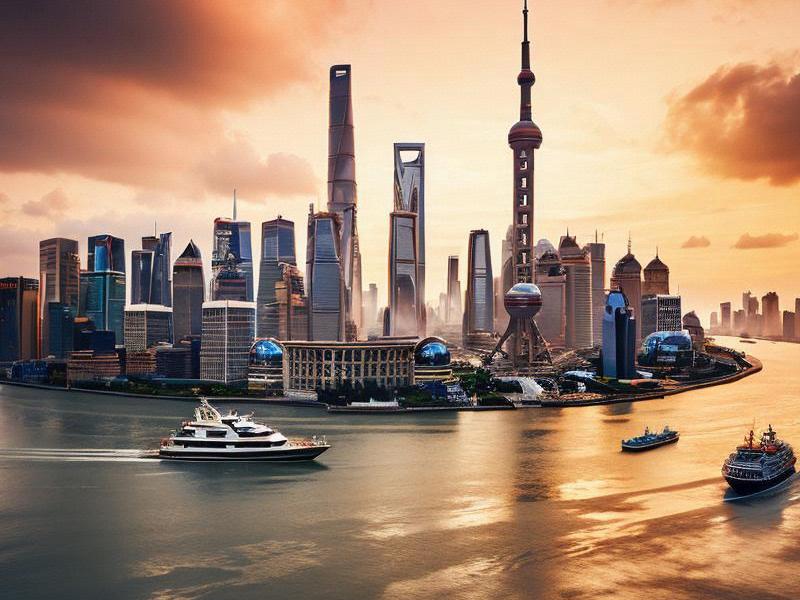
Shanghai, a city that has long been a symbol of China's opening up and reform, stands today as a testament to the nation's rapid economic rise and urbanization. Over the past few decades, Shanghai has undergone a profound transformation, evolving from a historic port city into a global metropolis that is not only a hub for commerce and finance but also a vibrant center for culture, innovation, and international exchange.
The economic growth of Shanghai has been nothing short of spectacular. As one of China's most important economic engines, the city has attracted a vast array of multinational corporations and financial institutions. The Shanghai Stock Exchange, established in the early 20th century, has grown into one of the largest and most influential stock markets in Asia. The city's Pudong New Area, developed in the late 20th century, has become a symbol of Shanghai's economic prowess, housing the iconic Oriental Pearl Tower, the Jin Mao Tower, and the Shanghai World Financial Center, among other skyscrapers.
The urban development of Shanghai is equally remarkable. The city has undergone extensive infrastructure projects, including the construction of the world's longest cross-sea bridge, the Donghai Bridge, and the Hongqiao International Airport, which serves as a major gateway for international flights. The expansion of the Shanghai Metro system has provided efficient and convenient transportation for millions of residents and visitors. Additionally, the city has invested heavily in green spaces and environmental sustainability, with initiatives such as the Bund Greenway and the construction of the world's first zero-carbon building, the Shanghai Tower.
上海龙凤阿拉后花园 Cultural integration is another key aspect of Shanghai's transformation. As a city that has historically been a melting pot of different cultures, Shanghai has embraced its diverse heritage while also fostering a modern and cosmopolitan culture. The city is home to numerous art galleries, theaters, and cultural institutions, such as the Shanghai Museum, the Shanghai Grand Theatre, and the Shanghai Cultural Square. The annual Shanghai International Film Festival and the Shanghai Fashion Week are just two examples of the many cultural events that attract visitors from around the world.
Shanghai's increasing global influence is evident in its role as a major center for international diplomacy and trade. The city has hosted numerous high-profile international events, including the APEC Leaders' Summit and the G20 Summit. Shanghai is also a member of the Global Cities Network and the World Economic Forum's Global Agenda Council on China. The city's strategic location and robust infrastructure make it an ideal hub for international business and cooperation.
One of the most significant aspects of Shanghai's transformation is its commitment to innovation and technology. The city has established itself as a leader in the development of new technologies, such as artificial intelligence, big data, and the Internet of Things. The Zhangjiang Hi-Tech Park, often referred to as "China's Silicon Valley," is home to numerous high-tech companies and research institutions. Shanghai's government has also implemented policies to support entrepreneurship and innovation, creating a favorable environment for startups and tech companies.
上海龙凤论坛419 Education is another area where Shanghai has made significant strides. The city is home to some of the best universities in China, such as Fudan University, Tongji University, and East China Normal University. These institutions have produced generations of talented graduates who have contributed to the city's economic and social development. Shanghai's education system is also known for its emphasis on innovation and critical thinking, preparing students for the challenges of the 21st century.
Tourism is a vital part of Shanghai's economy and a major draw for visitors from around the world. The city's rich history and vibrant culture are reflected in its many attractions, such as the Bund, the Old Town (Nanxiang), and the Yu Garden. The Shanghai Disneyland, opened in 2016, has become a popular destination for families and tourists alike. The city's culinary scene is also a highlight, offering a wide range of traditional Chinese dishes as well as international cuisine.
上海龙凤千花1314 Despite its rapid development, Shanghai has managed to preserve much of its historical and cultural heritage. The Bund, with its stunning views of the Huangpu River and the skyline of Pudong, is a reminder of the city's colonial past. The Old Town, with its narrow streets and traditional architecture, offers a glimpse into the lives of Shanghai's residents during the 19th and early 20th centuries. Efforts have been made to protect and restore these historic sites, ensuring that future generations can appreciate Shanghai's rich history.
Environmental sustainability is a growing concern for Shanghai as the city continues to grow and develop. The city has implemented various measures to reduce pollution and promote green living, such as the expansion of public transportation, the promotion of electric vehicles, and the construction of eco-friendly buildings. The Shanghai Green Roof Project, which encourages the installation of green roofs on buildings, is one example of the city's commitment to environmental sustainability.
In conclusion, Shanghai's transformation from a traditional port city to a global metropolis is a remarkable story of economic growth, urban development, cultural integration, and increasing global influence. The city's commitment to innovation, education, and environmental sustainability ensures that it will continue to thrive and serve as a model for other cities around the world. As Shanghai looks to the future, it remains a beacon of modernization and a symbol of China's aspirations on the global stage.
